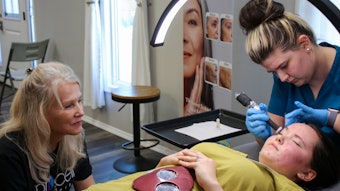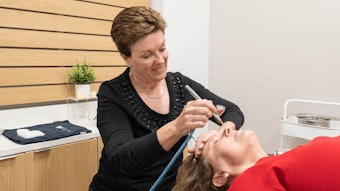
It’s not a coincidence that this year’s column begins in February, when every store window in town is filled with the frilly pink hearts of St. Valentine’s Day.
That’s because this article for the new skin therapist isn’t about romance—but truly following your heart.
The next four Good Hands columns—a whole year’s worth—are dedicated to closing the gap, educationally speaking, for skin care professionals. What does this have to do with following your heart? Good question. The answer is that learning also requires passion. Passion comes from the Latin word for “suffering.” It’s true! And while your career as a skin care professional shouldn’t be a shrine to pain, attaining success does require sacrifice and hard choices. Are you ready?
Commit to postgrad
It’s like this: If you are finishing your undergraduate studies and are about to take your licensing exam, be prepared to commit to at least two more years of intensive postgraduate education. You should make this commitment because the education requirement in the United States is lower than it is in the United Kingdom and Continental Europe. This means that your counterparts overseas—many of whom come to this country to work—generally carry with them at least two or three more years of full-time, advanced education than a typical U.S. esthetician, which was obtained as part of their undergraduate training. Skin care professionals in other major international markets simply are required to possess greater expertise much earlier in their careers. They also must pass many more practical and written examinations to be able to attain a recognized qualification and go on to practice skin care. This is not being said to sting, but simply to direct. Make the commitment now and understand that your real education begins after you get your license.
Prevent burnout
The rate of annual burnout in this industry is astronomical. Most of this attrition occurs early on, within the first year or two of passing the state board exam. This occurs for several related reasons, all of which should be prevented by committing to continue your studies.
- You feel isolated. Going directly into a work setting—which for a skin therapist generally means working alone in a small room—when you’re extremely green does not build confidence. Of course you have huge potential, but your skills are not finely tuned. How could they be? You may make mistakes during the treatment, or you simply may not yet know how to offer a superior experience to your clients. This may result in client dissatisfaction, ranging from mild to miffed—and ultimately in failure to retain clients. This does not feel good on either end of the professional equation and does not help your long-term professional prospects.
- You don’t network. This is an extension of the isolation. You don’t market yourself, so you lack opportunities to develop new clientele. You may not be busy enough at your primary job, so you might take a second part-time job. Disenchantment and burnout are right around the corner.
- You get distracted. If you feel that you aren’t gaining traction as a new therapist, you may start grasping for new, trendy, exotic treatments to attract business. This is the origin of the “novelty” skin care practice, where so-called treatments focus on unusual ingredients, such as gold, caviar and tourmalines. Some of these menu offerings are simply feel-good sessions, involving rose petals and chocolate. At the other end of the spectrum is an overreliance on hardware, machinery and dubious high-tech contraptions that promise to erase cellulite, miraculously slim the thighs, or eradicate wrinkles overnight. Maybe next you’ll start offering tarot readings between skin treatments.
Please.
Generally, such treatments are harmless, except that they tend to waste your clients’ money and undermine the credibility of the individual skin care professional, the facility at which the therapist is employed and the skin care profession at large. Once the menu becomes cluttered with wacky, whimsical specialties instead of the rock-solid foundation of skin examination and treatment, your days as a skin care therapist are numbered. You’ve effectively sabotaged your own success.
Let’s go back to the beginning. There are no shortcuts, but there is a smarter way to begin.
- Have a basic understanding of the skin’s structure and function. Your undergraduate training touched on this, but you certainly can’t know it all simply because you’ve successfully passed your state board exam.
- Comprehend the origins of common skin conditions and how to treat them. Become truly familiar with identifying and discussing every skin disorder and anomaly, which requires fluency in anatomy, physiology, biology and ingredient chemistry.
- Master the nuances of electrical modalities for the face. From here, you may be drawn into working with the undeniably lucrative services that comprise the medical spa industry, which primarily focuses on resurfacing procedures and injectables. Never offer a client a service that you cannot fully explain, especially when that service involves hard, cold steel and electricity.
- Explore the role of nutrition and other elements from the realm of wellness. This may lead to the more specific study of holistic therapies, such as ayurveda, Thai yoga therapy, acupressure, reflexology, aromatherapy and manual lymphatic drainage.
- Understand how the day-to-day operation of a skin care business works, beginning with the fundamentals of client service, retailing, ordering and inventory. This is true whether you plan to work for someone else or aspire to be on your own.
- Learn how to market yourself as a “product” or a “brand.” Step outside of the skin care context and look at yourself objectively: What do you offer that’s uniquely desirable in your profession? It may take a while for you to clearly identify this Unique Selling Proposition, or USP. The best way to start is to observe someone who’s already doing it.
Find a mentor
A golden rule of professional success: Find a mentor. More golden rules will be revealed in future installments of this column.
A mentor is a seasoned, wise professional who shares your passion for the science, the craft and the art of professional skin care. You may even find this mentor in your advanced classes.
The ideal mentor obviously is someone who is successful in the profession. Your mentor may or may not be an entrepreneur. So much publicity is given to the glamour of entrepreneurialism these days, but the fact is that some people are happier and better off soldiering under someone else, at least at the beginning of their careers.
It is a common pitfall to think that you have to jump immediately into independence and open your own business. This is a bit like deciding that you’ll open your own restaurant simply because you’ve learned to make a decent omelet. The omelet is a fine start, of course, but there needs to be a bit more to the business plan than whipping up a few eggs.
Your mentor may be older than you are, although this is not necessarily the case. True mentors are happy to share knowledge, so look for mentors who participate in class, offer ideas and seem open to having their brains picked.
Once you have established mutual interest with your prospective mentor, offer yourself as an apprentice. Work beside your mentor in the treatment room, on the retail floor, at check-in and at the register. Observe and perform whatever tasks have been delegated to you—and ask lots of questions after the glowing, smiling client has left the premises. Keep a journal and write down everything that happens during your apprenticeship; review these notes weekly. You should be paid for this phase, but don’t be greedy. Forget about eBay, Heatherette, Baby Phat handbags and fab sushi dinners out for a while. Remember, there will be some pain and suffering. Be willing to put in more hours than those for which you are paid, as long as you are learning.
Be a mentor
This column, which generally is intended for the fresh hands and minds who are just obtaining their licenses, is also a call to action to potential mentors. Just as the newly licensed therapist must be in a state of keen, alert engagement, it’s to the benefit of the entire industry for you seasoned professionals to keep your antennae up as well. Pay attention when a promising new therapist asks a really good question in class. Offer your expertise generously—hopefully, that newcomer will do the same for someone else someday.
The most essential mission of a mentor is to keep the novice on the heart’s path, and perhaps the most vital trait that mentors can instill in their charges is courage. The word courage is from the medieval French, derived from the Latin root-word for “heart.” Therefore, to become discouraged literally means “to lose heart,” and to lose touch with your most heartfelt essence. The heart’s way may not always be smooth and easy—it may, in fact, seem to be strewn with obstacles at times. But if this path is where one truly belongs, an individual must be able to bear the setbacks, learn from the challenges and continue traveling on. This is the only path that you as an individual know by heart.










